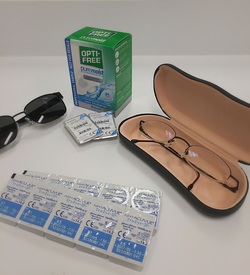
If you are planning to travel for the holidays and you wear glasses or contact lenses, make sure you are prepared. If you forget to plan and pack for your visual needs, your trip will be much less enjoyable and possibly more hazardous. Traveling involves unfamiliar areas and traffic patterns and other unknowns such as weather conditions which make clear vision essential to getting there and back safely. In addition to blurry vision, other travel-related safety and health issues pertain to improper contact lens wear and UV exposure.
Eyeglass wearers should make sure their glasses are in good working condition. Most optical shops will adjust and clean your glasses at no charge, regardless of where they were purchased. If you feel like your vision isn't as good as it could be, you may need to see your eye doctor and update your prescription so you can order new glasses prior to your trip. Whether you wear glasses or contacts, remember to pack a spare pair of glasses if you have an extra pair.
Contact lens wearers should make sure that they have an adequate supply of contacts on hand and pack spare lenses, along with a contact lens case and appropriate lens solution. If you are planning to fly and you intend to keep contact lens solution in your carry-on bag, remember that the bottle cannot exceed a volume of 3.4 ounces. Contact lens wearers should avoid transferring their solution from the stock bottle to a smaller non-sterile container thereby risking contamination, serious infections and vision problems. Many brands are available in sizes that are compatible with T.S.A. carry-on restrictions.
Most contact prescriptions have daily disposable options that can be very convenient for traveling and do not require the wearer to pack solution. I often write contact prescriptions for patients in their preferred 2-week or 1-month replacement brand but also write a prescription for a daily disposable brand in cases where that type of lens may be more convenient for travel or safer for recreational use - especially if the contacts will be worn for various water sports or other activities where the lens will be exposed to a recreational water source.
If you will be driving or spending much time outdoors, sunglasses can make your experience more enjoyable and provide protection for your eyes. Make sure your glasses provide UV protection. Polarized lenses are superior in many ways but they may not be for everyone. Whether you already have a favorite pair or are shopping for new sunglasses, your optician or your eye doctor can evaluate them and ensure that you have what you need.
Lastly, if your eye doctor has prescribed a topical eye drop for a medical condition that affects your eyes, don't forget to pack your medication(s). For chronic conditions like glaucoma, make sure you have enough medication to last and that refills are available so you can use them according to your doctor's directions.
Have a fun and safe holiday season. Remember to take care of your eyes so that they can take care of you - including when you travel.
Eyeglass wearers should make sure their glasses are in good working condition. Most optical shops will adjust and clean your glasses at no charge, regardless of where they were purchased. If you feel like your vision isn't as good as it could be, you may need to see your eye doctor and update your prescription so you can order new glasses prior to your trip. Whether you wear glasses or contacts, remember to pack a spare pair of glasses if you have an extra pair.
Contact lens wearers should make sure that they have an adequate supply of contacts on hand and pack spare lenses, along with a contact lens case and appropriate lens solution. If you are planning to fly and you intend to keep contact lens solution in your carry-on bag, remember that the bottle cannot exceed a volume of 3.4 ounces. Contact lens wearers should avoid transferring their solution from the stock bottle to a smaller non-sterile container thereby risking contamination, serious infections and vision problems. Many brands are available in sizes that are compatible with T.S.A. carry-on restrictions.
Most contact prescriptions have daily disposable options that can be very convenient for traveling and do not require the wearer to pack solution. I often write contact prescriptions for patients in their preferred 2-week or 1-month replacement brand but also write a prescription for a daily disposable brand in cases where that type of lens may be more convenient for travel or safer for recreational use - especially if the contacts will be worn for various water sports or other activities where the lens will be exposed to a recreational water source.
If you will be driving or spending much time outdoors, sunglasses can make your experience more enjoyable and provide protection for your eyes. Make sure your glasses provide UV protection. Polarized lenses are superior in many ways but they may not be for everyone. Whether you already have a favorite pair or are shopping for new sunglasses, your optician or your eye doctor can evaluate them and ensure that you have what you need.
Lastly, if your eye doctor has prescribed a topical eye drop for a medical condition that affects your eyes, don't forget to pack your medication(s). For chronic conditions like glaucoma, make sure you have enough medication to last and that refills are available so you can use them according to your doctor's directions.
Have a fun and safe holiday season. Remember to take care of your eyes so that they can take care of you - including when you travel.
